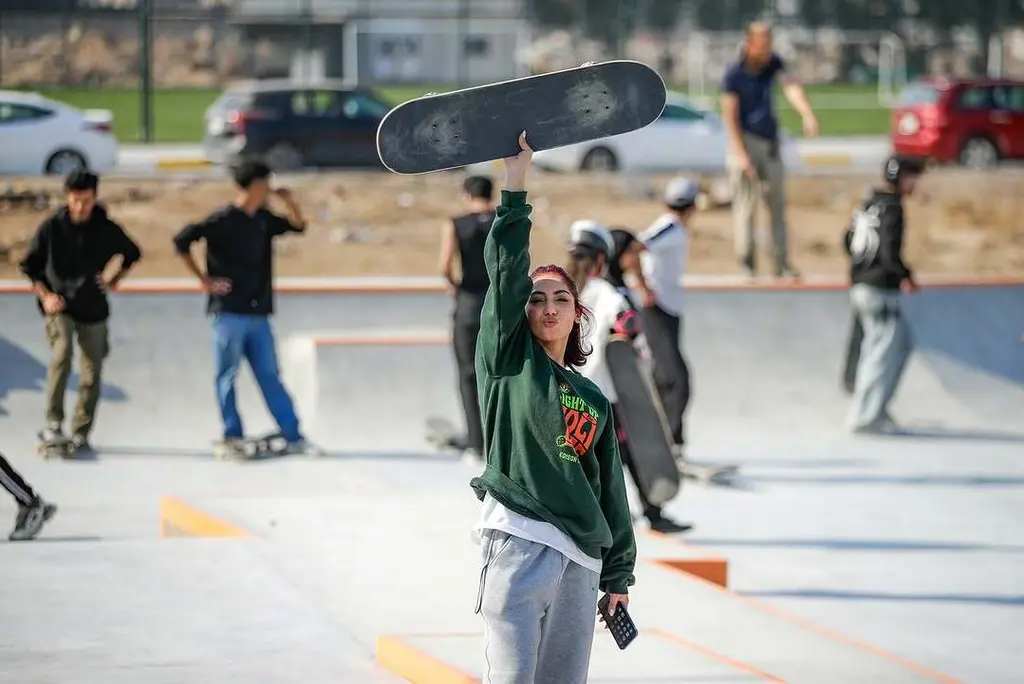Jeremie Daclin
- Text by Ed Andrews
- Photography by Davy Van Laere

Southern California. Skateboarding’s Mecca. It has everything: smooth concrete, drained pools, sunshine, the enduring legacy of Dogtown. But most importantly, it’s where the money’s at.
The skate empire may have planted flags worldwide, but the SoCal motherland has always retained unbridled influence over the skateboarding landscape with its style, slang and personalities. To make it in skateboarding, or so the myth goes, it helps if you’re prepared to relocate and cosy up to the industry overlords based in The Golden State.
But in 1997, a European champion skater from Lyon, France, decided he didn’t want to pursue the Californian gold rush, and instead chose to stay put in the country he’d always called home. When his sponsor Death Box run by Brits Jeremy Fox and Geoff Rowley shipped over the Atlantic from the UK and became Flip Skateboards, he decided to start a company of his own. His name was Jeremie Daclin and the foundations of his DIY venture – printing boards and t-shirts by scraping together a few Francs – would become the now-renowned Cliché skateboards.
“To be professional and get things like plane tickets instead of just a few boards, you had to move to the States. But I didn’t want to so I thought about starting a company where skateboarders could get salaries from skateboarding and still live in Europe,” remembers Jeremie over the phone, explaining the company’s history with an audible shrug and laissez faire air. “I had nothing to expect from Cliché. It was just to make skateboards and give them, along with a little money, to my friends. Keep having fun, travel, skate and do what I was doing. Nothing more.”
The need to break the ‘California rules’ mindset and support more Europeans on the scene was also noted by Parisian skate writer and photographer Benjamin DeBerdt, who’s been taking observational notes on French skateboarding since 1999. “Europe has seasons and cultural differences,” says Benjamin. “Of course Californian skateboarding was an enormous influence, but some stuff would just not work for us. Cliché was a way to develop something that made sense for us in general, I think.”
One of the first people to get onboard with Jeremie’s vision was Javier Mendizabal, a skater from the Basque country who’s been on the team since 1999. “What appealed to me about Cliché was the idea I could be part of something closer to where I’m from, both physically and culturally,” says Javier. “Like Jeremie, I’ve always been pretty clear in my mind that I didn’t want to live in the States, so I didn’t care if it was a really small French company not going anywhere or so people told me at that time. For me it was just a true skate project coming from skaters who respected each other.”
Success may have come as a happy coincidence for Jeremie and his team, but nowadays having recently hit its fifteenth anniversary Cliché is respected around the globe. With Jeremie as team manager, it sponsors an international, all-terrain team including Daclin’s countrymen Lucas Puig, Charles Collet and Flo Mirtain; Australians Sammy Winter and Andrew Brophy; and Americans Joey Brezinski, Daniel Espinoza and Pete Eldridge. It’s also found respect from the SoCal-centric industry with plenty of props and coverage from the likes of Thrasher and Transworld (with the latter awarding them Best Team at their annual awards ceremony in 2006), and much hype given to their upcoming team video, Bon Voyage, to be released in March 2013.
“Now with the internet, videos and everything, you can come out with a crazy video part from a small little town and be worldwide famous after that,” says Jeremie. And yet, for a period in the mid-nineties, Jeremie may as well have been in California. When Mark Gonzales followed a girlfriend to Lyon in 1995/’96, Jeremie found himself hanging out with a leading figure of the SoCal fable. “He was dating a girl and she went to Lyon to study French for one year so they went there. That’s how I met him,” Jeremie explains. “We skated together for a year. Back then, I ran a shop in Lyon so he started hanging out and skating for the shop. It was crazy at that time to have him around. He used to love skating late at night. He comes to Lyon sometimes and we hang out.”
He pauses then adds: “For me, he’s the OG Z-boy. He’s the real deal, the guy who brought the skateboard outside, the real tricks to handrails, skateboarding in the streets. The Z-boys brought the skateboards into pools but they didn’t do any tricks. He did all the tricks and invented everything.”
In some ways, the success of Cliché has mimicked the path of Mark Gonzales himself, starting out from a core skate background yet unafraid to explore its artistic side with a light-hearted, youthful vigour. The fruits of Cliché’s endeavours led by creative director Eric Frenay include cruisers, corkscrews and guest boards given to the likes of Chet Childress and Mark Gonzales himself. There’s also a collection of artsy promo videos shot by pioneering lensmen Fred Montagne, aka French Fred, that blend fine-art photographic compositions with classy, all-terrain skating.
“Cliché in French means taking a picture,” explains Jeremie, “So the vision was always based in art and pictures. The people who work for Cliché were more involved in skateboarding than creative studies. The artistic side is more about a state of mind than studying it at [prestigious] schools.”
As a company that thinks and acts visually, Cliché have become known for their high-end publishing ventures, putting out a number of photography books like their canonical Cliché RéSUMé and Hand in Hand, a selection of French Fred photos from their ‘Mazel Tov’ tour of Israel in 2010. When they tour, Jeremie insists the focus is more on getting pictures both still and moving – and less on shop signings and demos. And yes, like the rest of the skate world, you can now follow them on Instagram.
But with expansion comes the endless need to shift more product and monetise the act of skating so that people can get paid. As part of this, in 2009 Cliché went under the wing of El Segundo-based industry giant Dwindle Distribution following a stint of ownership by Adidas-Salomon and now finds itself accountable to the SoCal masters that were shunned a decade and a half ago. Not that such an arrangement seems to dampen Jeremie’s enthusiasm.
“[Profit] is a component of how we think, but it’s not a very important component. Creativity is more important than making money right now for us,” insists Jeremie. “It’s pretty much the same as ever. We’re still in Lyon doing what we want.”
Look out for Cliché skateboards new team movie, Bon Voyage, to be released in March 2013.
You might like

At Belgium’s Horst, electronic music, skate and community collide
More than a festival — With art exhibitions, youth projects and a brand new skatepark, the Vilvoorde-Brussels weekender is demonstrating how music events can have an impact all year round.
Written by: Isaac Muk

Volcom teams up with Bob Mollema for the latest in its Featured Artist Series
True to This — The boardsports lifestyle brand will host an art show in Biarritz to celebrate the Dutch illustrators’ second capsule collection.
Written by: Huck

In Baghdad, skater girls are reshaping Iraqi womanhood
Baghdad is rad — As the city’s first skatepark opens, the new space is providing a blank canvas for its board culture. Dalia Dawood speaks to the people looking to make its ramps and rails a safe haven for women and girls.
Written by: Dalia Dawood

In England’s rural north, skateboarding is femme
Zine scene — A new project from visual artist Juliet Klottrup, ‘Skate Like a Lass’, spotlights the FLINTA+ collectives who are redefining what it means to be a skater.
Written by: Zahra Onsori

From his skating past to sculpting present, Arran Gregory revels in the organic
Sensing Earth Space — Having risen to prominence as an affiliate of Wayward Gallery and Slam City Skates, the shredder turned artist creates unique, temporal pieces out of earthly materials. Dorrell Merritt caught up with him to find out more about his creative process.
Written by: Dorrell Merritt

Baghdad’s first skatepark set to open next week
Make Life Skate Life — Opening to the public on February 1, it will be located at the Ministry of Youth and Sports in the city centre and free-of-charge to use.
Written by: Isaac Muk

